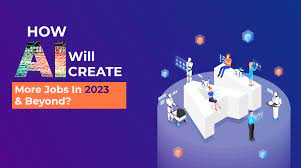
How AI could be impacting the job market in 2023?
AI and automation have been transforming various industries and job sectors over the years. While AI has the potential to create new jobs and enhance productivity, it can also lead to job displacement in certain areas. Here are some ways AI could be impacting the job market in 2023:
- Automation of Routine Tasks: AI and robotic process automation (RPA) are increasingly being utilized to perform repetitive and mundane tasks. This could lead to job losses in fields like data entry, manufacturing, customer service, and administrative roles.
- Autonomous Vehicles: The development of self-driving vehicles and drones may reduce the need for human drivers and operators in transportation and logistics industries, potentially impacting truck drivers, delivery drivers, and other related roles.
- Retail Automation: The growth of AI-powered checkout systems and automated warehouses might lead to fewer jobs in retail, as traditional cashier and stocking positions could be replaced by automated solutions.
- AI in Customer Support: AI-driven chatbots and virtual assistants are becoming more sophisticated, which could result in reduced demand for human customer support agents.
- Analytical and Decision-Making Roles: AI and machine learning algorithms are becoming more adept at analyzing data and making decisions. This could affect job roles like data analysts, financial analysts, and even some managerial positions.
- Manufacturing and Industry: Advancements in AI and robotics could lead to more automation in manufacturing processes, leading to fewer job opportunities for assembly line workers and machine operators.
- Content Creation and Journalism: AI-generated content, including articles and news stories, may impact traditional journalism and content creation jobs.
It’s important to note that while AI can lead to job displacement in certain areas, it can also create new job opportunities in fields like AI research, data science, programming, and AI ethics.
Moreover, history has shown that technological advancements often lead to shifts in the job market, with some jobs becoming obsolete while new ones emerge. Policymakers and businesses need to adapt to these changes by providing training and upskilling programs to help workers transition into new roles that complement AI technologies.
